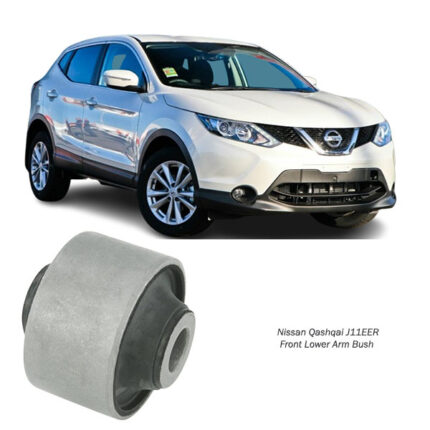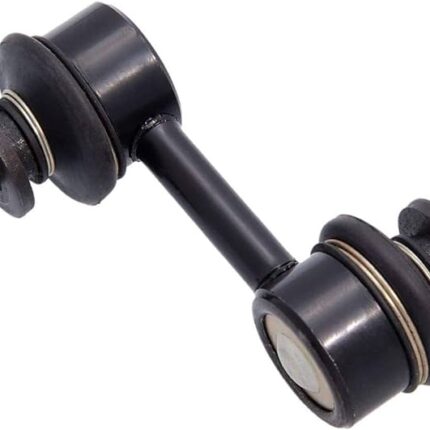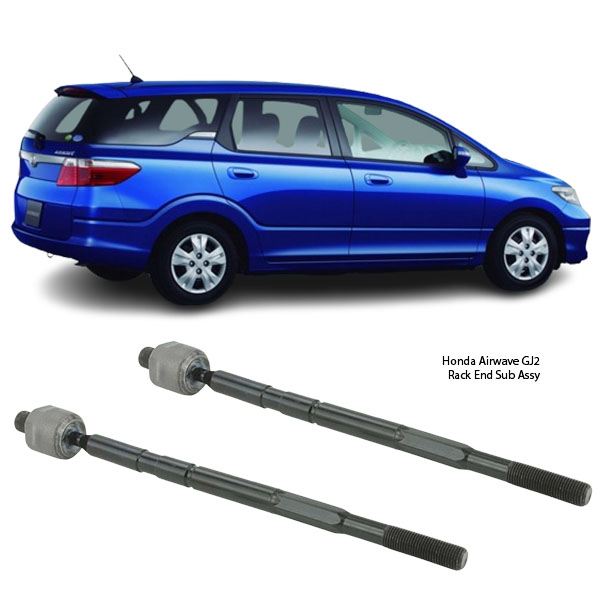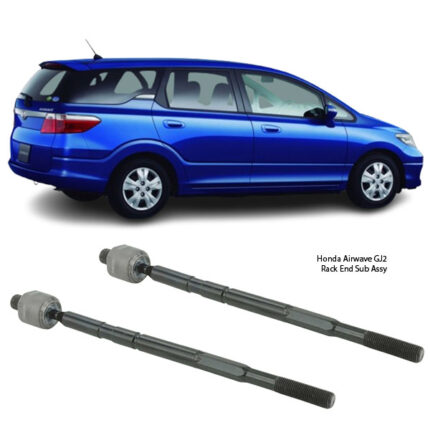-13%
Get Honda Airwave GJ2 Rack End Sub Assy 0322-GJ2 in Kenya
The rack end sub-assembly, also known simply as the rack end, is an important component in a vehicle’s steering system, specifically in vehicles equipped with rack and pinion steering. It plays a critical role in ensuring that the steering input from the driver is effectively transmitted to the wheels, allowing for precise control and handling of the vehicle. Here’s a detailed overview of the rack end sub-assembly, its functions, signs of wear, and maintenance considerations:
Functions of Rack End Sub-Assembly
- Steering Linkage
Primary Function: Connect the rack and pinion assembly to the steering linkage, typically through tie rods.
Details:
- Transmission of Steering Input: When the driver turns the steering wheel, the rack end translates this rotational movement into lateral movement of the tie rods.
- Directing Wheel Movement: This lateral movement of the tie rods causes the wheels to turn left or right, enabling the vehicle to change direction.
- Maintaining Steering Alignment
Primary Function: Help maintain proper alignment of the front wheels.
Details:
- Alignment Stability: The rack end, along with the tie rods and other steering components, ensures that the front wheels remain aligned correctly.
- Prevention of Steering Wander: Proper alignment contributes to stable and straight-line steering, preventing the vehicle from pulling to one side.
- Supporting Steering Response
Primary Function: Contribute to responsive steering control.
Details:
- Precise Steering: The rack end’s connection ensures that steering inputs are promptly and accurately transmitted to the wheels.
- Enhanced Handling: Responsive steering improves the vehicle’s handling, especially during cornering and maneuvers.
- Endurance Under Load
Primary Function: Endure the forces exerted during steering maneuvers.
Details:
- Load Bearing: The rack end is designed to withstand the forces generated during steering, such as those encountered during turns or when driving over uneven surfaces.
- Durability: High-quality rack ends are durable and resistant to wear, ensuring longevity and reliability under normal driving conditions.
Signs of Worn or Failing Rack End Sub-Assembly
- Loose Steering
Description: Increased play or looseness in the steering wheel.
Details:
- Worn Joints: Excessive wear in the rack end’s joints can lead to play or slack in the steering linkage, causing the steering wheel to feel loose.
- Safety Concern: Loose steering can affect the vehicle’s responsiveness and handling, posing a safety risk.
- Uneven Tire Wear
Description: Abnormal wear patterns on the front tires.
Details:
- Alignment Issues: A failing rack end can cause improper alignment of the front wheels, leading to uneven tire wear.
- Visible Inspection: Inspecting the front tires for signs of wear can indicate issues with the steering components, including the rack end.
- Steering Noise
Description: Unusual noises when turning the steering wheel.
Details:
- Knocking or Clunking: Worn or loose rack end joints may produce knocking or clunking sounds, especially during steering maneuvers.
- Bushings or Bearings: Failure of the rack end bushings or bearings can also contribute to steering noise.
- Fluid Leaks
Description: Presence of power steering fluid leaks near the rack end.
Details:
- Seal Damage: Seals within the rack end assembly can wear out over time, leading to fluid leaks.
- Hydraulic System: Leaks can affect the performance of the power steering system, causing difficulty in steering.
- Visible Damage or Corrosion
Description: Visible signs of physical damage or corrosion on the rack end.
Details:
- Rust: Corrosion on the rack end assembly, particularly at joints or mounting points, can indicate potential weaknesses or wear.
- Physical Damage: Impact damage or wear from road debris can compromise the integrity of the rack end.
Maintenance and Replacement
- Regular Inspection: Periodically inspect the rack end and steering components for signs of wear, damage, or leaks.
- Alignment Checks: Ensure regular wheel alignment checks to detect and correct any misalignment issues promptly.
- Fluid Checks: Monitor power steering fluid levels and inspect for leaks around the rack end and steering system.
- Professional Maintenance: Have a qualified mechanic perform routine maintenance and inspections to ensure the steering system remains in optimal condition.
- Timely Replacement: Replace worn or damaged rack ends promptly to maintain steering responsiveness and safety.
Follow us on Facebook for more parts.




